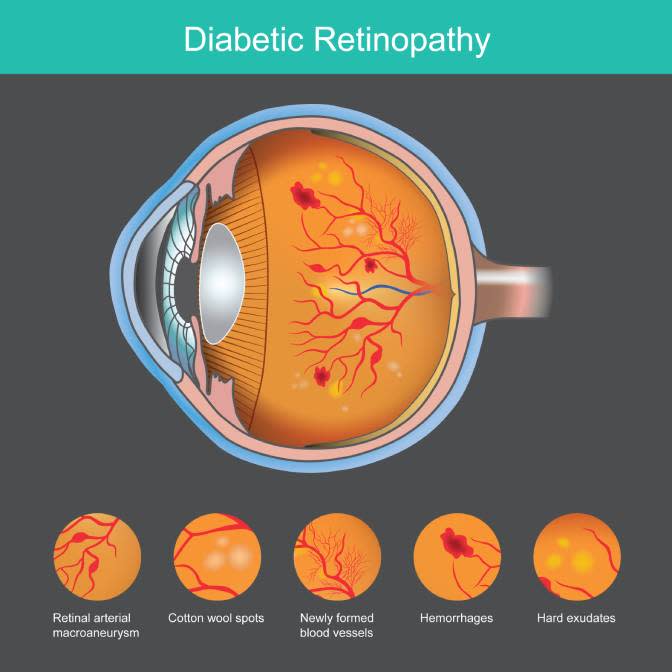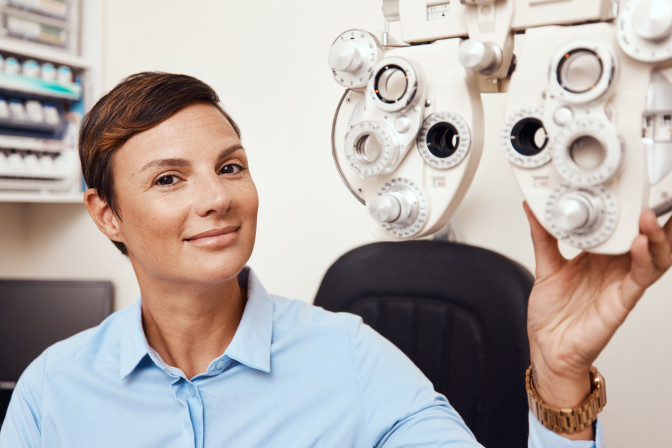Buy one pair of eyeglasses, get a second pair 50% off!
*Restrictions apply. Click here for details.
Diabetic Retinopathy Screenings in North Carolina
Visit Our North Carolina Diabetic Retinopathy Specialists

Diabetes affects over 1,000,000 people in North Carolina. Those with diabetes are at a high risk of developing diabetic retinopathy, an eye condition that can lead to serious vision problems and even blindness if left untreated.
High blood sugar caused by diabetes can cause damage to the blood vessels located in the retina, a layer of tissue lining the back of your eye. This condition is known as diabetic retinopathy.
Diabetic retinopathy can affect all ages. and is the leading cause of preventable blindness. This eye condition is a very common and serious complication of diabetes, making early detection vital.
The North Carolina eye doctors at eyecarecenter are experts at diagnosing diabetic retinopathy. After diagnosis, we will work with you to determine the best treatment plan to manage your condition.
Find Diabetic Retinopathy Screenings Near You

At the eyecarecenter, our goal is to provide every patient with the best vision possible. We are conveniently located throughout North Carolina. Find us in Charlotte, Raleigh, Durham, Winston-Salem, and other towns throughout the Tar Heel State.
What Is Diabetic Retinopathy?
Diabetic retinopathy is the most common form of diabetic eye disease. High blood sugar levels cause changes that damage blood vessels in the retina, which leads to the blood vessels swelling. Because of the swelling, the damaged vessels will begin to leak fluid into the rear of the eye.
Diabetic macular edema (DME) occurs when there is fluid build-up in the macula, the central portion of the retina that we use to see straight ahead. The macula is responsible for our clearest vision.
DME is responsible for about 50% of vision loss in patients with diabetic retinopathy.
Those with diabetes should have a dilated eye examination at least once a year to check for diabetic retinopathy.
If diabetic retinopathy goes untreated it will gradually become more serious. This eye condition can progress, leading to worsened vision and even blindness. Early detection and treatment can prevent vision loss.
Those living with diabetes long-term are at a higher risk of developing diabetic retinopathy. Diabetic retinopathy is the leading cause of acquired blindness in patients over age 65.
Diabetic Eye Exams From Local North Carolina Optometrists
It’s possible to have diabetic retinopathy without experiencing symptoms. This makes it vital to have regular diabetic eye exams to monitor your ocular health.
Early detection is critical when it comes to treating diabetic retinopathy. Our specialists at eyecarecenter will perform a retinal screening for diagnosis and create a treatment plan that is right for you.
Advanced Treatment Options for Diabetic Retinopathy
eyecarecenter’s eye doctors are highly skilled in diagnosing patients with diabetic retinopathy and managing their conditions.
We understand the dangerous implications and time-sensitive manner in approaching this health condition. Your treatment will be based on the severity of your condition.
A few treatment options are:
Laser surgery which reduces the amount of blood needed by the retina for producing new blood vessels. This procedure can also reduce bleeding and swelling of the retina.
Medications such as Avastin, Eylea, and Lucentis. These medications help stop new leaky blood vessel growth and ultimately reduce swelling of the macula. This slows the rate of vision loss.
Get Checked for Diabetic Retinopathy at eyecarecenter

If you have type 1 or type 2 diabetes, schedule an appointment at your nearest eyecarecenter location.
Our expert doctors will perform a retinopathy screening to detect any signs of the disease. If detected, our eye care professionals will create a treatment plan to protect your vision.
Frequently Asked Questions About Diabetic Retinopathy
In some cases, very mild forms can be resolved with strict blood glucose control. Early detection is the best way you can prevent diabetic retinopathy from taking your vision.
See an eye doctor every few months and treat damage before developing symptoms.
If you are diabetic, yes. It’s estimated that 80% of people with diabetes will develop some form of diabetic retinopathy.
Getting screened for diabetic retinopathy is quick, easy, and often covered by insurance.
The best way to diagnose diabetic retinopathy is with a comprehensive dilated eye exam. Your eye doctor will put drops in your eyes to dilate your pupils. This allows them to have a better view inside your eyes. The drops can cause your close vision to blur and sensitivity to light for a few hours after.
